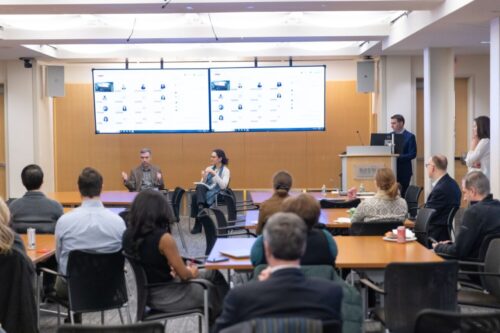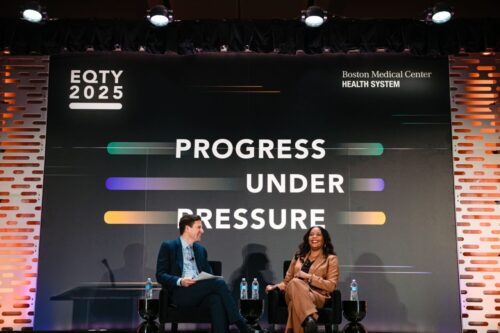BMC Is Poised to Enter the CAR T-Cell Therapy Clinical Trials Ecosystem
January 11, 2023

Dave Markey, Boston Medical Center
Pharmaceutical manufacturers are working to expand access to CAR T clinical trials by partnering with hospitals like BMC that care for racially diverse patients.
CAR T-Cell therapy is a one-time treatment that uses a patient’s own immune cells to combat tough-to-treat cancers: lymphomas, some leukemias, and multiple myeloma. The first CAR T-Cell therapy (CAR T) became commercially available in 2017, and over the last decade thousands of patients have received CAR T therapies through clinical trials.
These transformative therapies, during which a patient’s own immune cells are collected, genetically modified, and returned to the patient, typically come with a commercial price tag of up to $500,000 — not factoring in additional clinical care costs pertaining to administration of the therapy. For patients lucky enough to access CAR T through clinical studies, the therapy and the cost of its administration is free. But CAR T clinical trials have historically been offered only at the wealthiest hospitals and have reached a disproportionately low number of Black and Hispanic patients.
“If you’re looking to create CAR T access for patients from underrepresented racial and ethnic populations, it would make sense for manufacturers of CAR T clinical trials to partner with the top-ranking hospitals for inclusivity,” says Bhavesh Shah, RPh, BCOP, Boston Medical Center’s chief pharmacy officer and an expert in hematology and oncology pharmacy. “If the top-ranked hospitals do not even appear as clinical trial sites, that’s not going help close the long-standing health equity gap in oncology.”
Among healthcare centers currently participating in CAR T clinical trials, there aren’t any others with expertise in serving racially and ethnically diverse communities like Boston Medical Center (BMC), where more than 70% of patients identify as persons of color and 50% are below the federal poverty level. The Lown Institute Hospital Index ranks more than 3,600 U.S. hospitals annually on inclusivity and clinical outcomes, and BMC is currently ranked No. 4 in the country. But treatment centers that so far have offered CAR T-Cell therapy to their patients rank lower than 1,000th place on Lown’s Index, including the three centers currently offering CAR T in Massachusetts.
“Once these therapies started to [move through clinical trials and] get approved by the FDA, it became clear that not everybody had the same access to them,” Fabio Petrocca, MD, director of BMC’s Cellular Therapy Program, recently told HealthCity.
BMC is shifting the clinical trials ecosystem for CAR T cancer cell therapy
Federal agencies have taken notice of the problem and its implications for health equity. In April 2022, the FDA released a set of guidelines for clinical trials, including CAR T trials, to prioritize recruitment of patients with more diverse racial and ethnic backgrounds. And in May 2022, a Congressionally-mandated report from the National Academies of Sciences, Engineering, and Medicine found that “lack of representation in research is compounding disparities in health outcomes, with serious consequences for underrepresented groups and the nation as a whole,” according to a press release about the report.
“Historically, CAR T clinical trial participation has happened in mostly white populations,” says Kristen Hege, senior vice president of early clinical development in hematology/oncology & cell therapy at Bristol Myers Squibb, which manufactures two FDA-approved CAR T products. “The ecosystem of clinical research enables patients to receive free, potentially lifesaving care. So, it makes sense that the best way to get affordable CAR T therapy delivered to a more diverse group of patients is to increase clinical trial participation in the hospitals that serve them. But the track record for clinical trial enrollment has not been as diverse yet as the industry had hoped. We need to do better.”
Manufacturers like Bristol Myers Squibb — which perform the genetic modification of patients’ T cells to turn them into supercharged CAR T cells capable of targeting and destroying cancer — are eager for clinical trial sites to open at BMC and other hospitals that serve racially and ethnically diverse patients, Hege says.
“Our goals and mission are no different than those of healthcare providers: We want to transform patients’ lives through science and to deliver innovative medicines to the people who will benefit,” she says. “These patient-specific therapies like CAR T really drive that impact home. Everyone knows they are working on one individualized therapy for one specific patient. Yet we have more work to do to ensure the ecosystem around clinical trials and medicine generally better reflects the diversity of the patient populations being treated. “
Building an operational footprint for CAR T
Shah and Petrocca say that, based on ongoing discussions the hospital is having with CAR T pharmaceutical manufacturers, BMC anticipates becoming a CAR T clinical trial site for multiple myeloma this year, in 2023, with additional CAR T trials for other cancers to follow.
“BMC has partnered with multiple CAR T manufacturers to help accelerate access to these lifesaving therapies and to help fulfill our long-standing commitment to health equity,” Shah says.
After more than a year of groundwork by numerous BMC clinicians and hospital administrators, Shah and Petrocca’s teams plan to deliver CAR T-Cell therapy to the first BMC patient this year, and soon.
“There’s a huge operational footprint we needed to create in order to operate a CAR T treatment program,” Shah says.
Some of those operational aspects have already been long in place at BMC: “We have the strength at BMC to address many social determinants that can directly impact clinical trial outcomes in under-resourced patient populations. At BMC, we ensure transportation for folks without steady access to a car, provide interpreters to patients who don’t speak English, put patients in housing if they are experiencing homelessness during treatment, and most importantly, provide food for patients with food insecurities,” Petrocca says. “All these factors go into making clinical trial participation access feasible for our patients, no matter their personal life circumstances.”
Running practice drills and negotiating with payors
Other aspects of BMC’s CAR T clinical trial infrastructure needed to be built from scratch or by collaborating with other hospitals that have already been administering CAR T treatments.
“One of the biggest barriers to having a program like this is that it requires multi-disciplinary collaboration: You have your apheresis collection team, your inpatient hematology/oncology unit, your intensive care unit, your emergency department, and everybody needs to be aware of precisely how to manage the unique toxicities that are possible with CAR T treatment,” Shah says. (In some patients who receive CAR T, there is risk of cytokine release syndrome, or CRS, which can cause a dangerous cascade of inflammation throughout the body. Without proper intervention, it can be lethal.)
“We have the strength at BMC to address many social determinants that can directly impact clinical trial outcomes in under-resourced patient populations”
After BMC’s hematology lab collects a patient’s T cells, the lab sends them to a pharmaceutical manufacturing facility where the cells will be genetically modified. After the cells are genetically modified into CAR T-cells, the final product will be shipped back to BMC, prepared, and infused back into the patient’s veins.
BMC teams have been busy getting set up for every possible scenario that could happen while treating a patient with CAR T. According to Shah, high-level collaboration is key. Teams have come together to implement department-specific education, dry runs, and testing out orders of care in various settings, including the emergency department. They’ve also developed a special code-red pager for CAR T patients that will activate if someone shows up in the ED with signs of CRS.
“We’ve really walked carefully through every step of the way, anticipating any and every situation that could occur from when CAR T patients are initially screened for eligibility all the way to when the treatment is complete,” Shah says.
Aside from the operational considerations which need to be in place for patient safety, there are also financial aspects to contend with. Their ultimate goal is to make sure that, beyond clinical trial participation, CAR T products are also available commercially to BMC patients without robust — or any — insurance coverage.
For more information on the CAR T-Cell cancer therapy program, visit its page on BMC.org.


